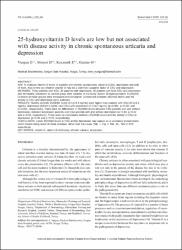25-hydroxyvitamin D levels are low but not associated with disease activity in chronic spontaneous urticaria and depression
Abstract
AIM: To evaluate vitamin D levels in patients with chronic spontaneous urticaria (CSU), depression and both of them, thus to fi nd out whether vitamin D may be a common causative factor of CSU and depression. METHODS: Thirty patients with CSU, 30 patients with depression, 30 patients with both CSU and depression and 30 healthy volunteers as control group were involved in the study. Serum 25-hydroxyvitamin D (25(OH) D) levels of these groups were measured and compared. Correlations between 25(OH)D levels and the activity of CSU and depression were analyzed. RESULTS: Healthy controls' 25(OH)D levels (17.2±8.8 ng/mL) were higher than patients with CSU (9.1±5.1 ng/mL), depression (8.9±6.1 ng/mL) and CSU with depression (7.7±4.7 ng/mL) (p<0.001, p<0.001 and p<0.001, respectively). There were no differences in 25(OH)D levels between CSU patients with and without depression, between depression patients and CSU patients with and without depression (p=0.43, p=0.82 and p=0.92, respectively). There were no correlations between 25(OH)D levels and the activity of CSU or depression (p=0.99 and p=0.76, respectively). CONCLUSION: Lower 25(OH)D levels in CSU and/or depression may appear as a secondary phenomenon, which means being result of these diseases rather than the cause (Tab. 1, Fig. 2, Ref. 41). © 2020 Comenius University.



















